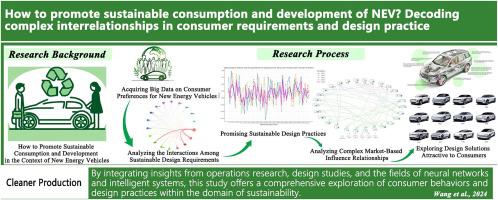How to promote sustainable consumption and development of NEV? Decoding complex interrelationships in consumer requirements and design practice
IF 10
1区 环境科学与生态学
Q1 ENGINEERING, ENVIRONMENTAL
引用次数: 0
Abstract
In addressing the global need for sustainable development, the rapidly growing new energy vehicle (NEV) industry has gained international attention as a key emerging sector. This investigation explores the complex interrelationships between sustainable design factors from both consumer-focused and operational perspectives across the stages of design, production, and market introduction of NEVs. Furthermore, the research highlights the importance of creating intelligent design solutions that align with the psychological and emotional expectations of consumers, thereby promoting the sustainable use of NEVs and contributing to worldwide sustainability initiatives. This study introduces an innovative framework designed to clarify the complex interactions among sustainable design factors and to create consumer-centric, intelligent design solutions. Initially, using extensive big data from the Chinese NEV market, the research utilizes natural language processing techniques to identify consumer-relevant factors. Subsequent analyses explore the profound impact and importance of these factors within sustainable design. Additionally, the study assesses sustainable design practices well-suited to the Chinese market with significant growth potential, utilizing hierarchical decomposition and network visualization to facilitate effective managerial implementation. Ultimately, this research employs latent diffusion models and prioritization strategies to evaluate and refine designs that align with consumer preferences for the aesthetic aspects of NEVs. It guides companies and designers to abandon traditional design approaches in favor of innovative, intelligent, and sustainable designs that engage consumers. By integrating insights from operations research, design studies, and the fields of neural networks and intelligent systems, this study provides a comprehensive exploration of consumer and design practices within the sustainability domain, delivering innovative insights that drive global progress and sustainable consumption of new energy vehicles.

如何促进新能源汽车的可持续消费和发展?解码消费者需求和设计实践中复杂的相互关系
在应对全球可持续发展需求的过程中,快速发展的新能源汽车产业作为一个重要的新兴产业受到了国际社会的关注。本研究从消费者和运营角度探讨了新能源汽车在设计、生产和市场引入阶段可持续设计因素之间复杂的相互关系。此外,该研究还强调了创造符合消费者心理和情感期望的智能设计解决方案的重要性,从而促进新能源汽车的可持续使用,并为全球可持续发展倡议做出贡献。本研究引入了一个创新的框架,旨在澄清可持续设计因素之间复杂的相互作用,并创造以消费者为中心的智能设计解决方案。首先,该研究利用中国新能源汽车市场的大量大数据,利用自然语言处理技术来识别与消费者相关的因素。随后的分析探讨了这些因素在可持续设计中的深远影响和重要性。此外,本研究评估了非常适合具有显著增长潜力的中国市场的可持续设计实践,利用分层分解和网络可视化来促进有效的管理实施。最后,本研究采用潜在扩散模型和优先级策略来评估和改进符合消费者对新能源汽车美学方面偏好的设计。它引导公司和设计师放弃传统的设计方法,转而采用创新、智能和可持续的设计来吸引消费者。通过整合运筹学、设计研究、神经网络和智能系统领域的见解,本研究对可持续发展领域的消费者和设计实践进行了全面探索,提供了推动全球进步和可持续消费的创新见解。
本文章由计算机程序翻译,如有差异,请以英文原文为准。
求助全文
约1分钟内获得全文
求助全文
来源期刊

Journal of Cleaner Production
环境科学-工程:环境
CiteScore
20.40
自引率
9.00%
发文量
4720
审稿时长
111 days
期刊介绍:
The Journal of Cleaner Production is an international, transdisciplinary journal that addresses and discusses theoretical and practical Cleaner Production, Environmental, and Sustainability issues. It aims to help societies become more sustainable by focusing on the concept of 'Cleaner Production', which aims at preventing waste production and increasing efficiencies in energy, water, resources, and human capital use. The journal serves as a platform for corporations, governments, education institutions, regions, and societies to engage in discussions and research related to Cleaner Production, environmental, and sustainability practices.
 求助内容:
求助内容: 应助结果提醒方式:
应助结果提醒方式:


